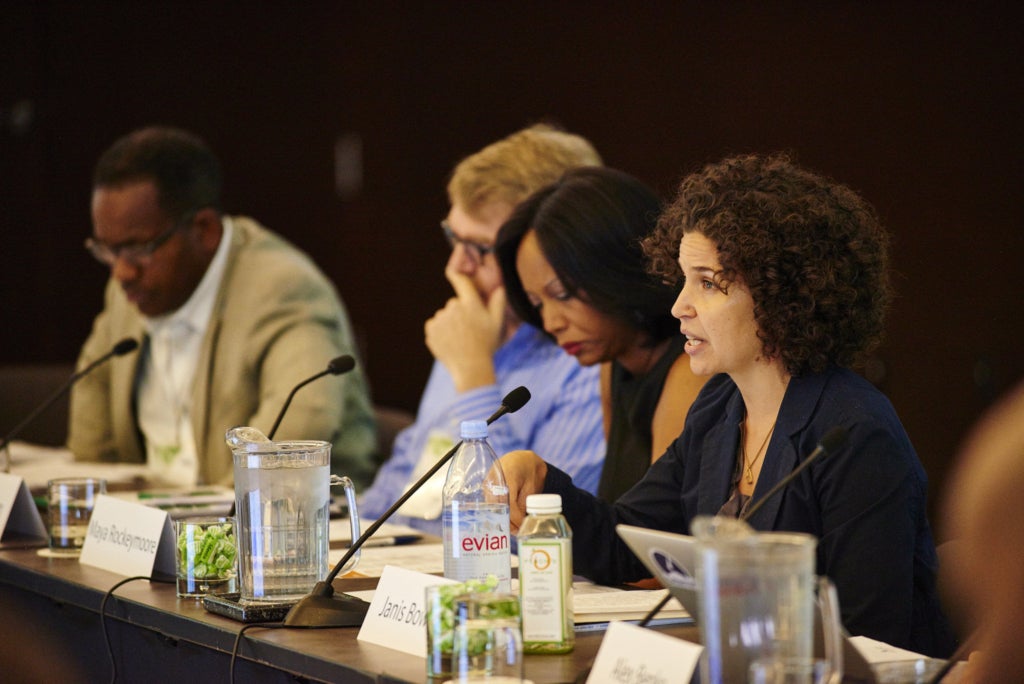The Aspen Initiative on Financial Security held its fourth annual Financial Security Summit in July in Aspen, Colorado. This is the seventh in a series of seven posts describing each Summit session. Links to the other posts and an overview of the Summit can be found here.

In the afternoon of July 17th, Summit participants gathered for a final panel, “The Future of Financial Innovation, Inclusion, & Shared Prosperity.” The session featured Alex Benke, Director of Advice Products at Betterment; Janis Bowdler, Head of Financial Capability and Community Development at JPMorgan Chase & Co; CFED founder Bob Friedman; Brookings Institution Guest Scholar Josh Gotbaum; Mary John Miller, former Under Secretary for Domestic Finance at the U.S. Treasury; CEO of Global Policy Solutions Maya Rockeymoore; and was moderated by Michael Fletcher of the Washington Post. This session gave participants a chance to learn more about some of the most compelling recent innovations in retirement savings, investing, and asset-building, and to integrate topics and concerns from previous panels.
First, Janis Bowdler described how the JPMorgan Financial Solutions Lab uses the power of technology to improve access to mainstream financial markets. Technological innovations can make products more efficient, cheaper, and user-friendly. Funding through the Lab gives innovative companies a chance to focus on their mission without the pressure to immediately achieve economies of scale. However, Bowdler cautioned that there is no “silver bullet” in product innovation; we need a “synergy of all products working together” to improve financial security. Alex Benke from Betterment continued the discussion of technological innovation in financial services by explaining how online companies like his work to deliver a low-cost, automated investing service to thousands of customers nationwide. By using web and mobile platforms, online “robo advisors” are developing innovations that are driving down costs and making investing accessible to all by not requiring a minimum balance. Benke argued that public policy needs to move faster to keep up with technological innovations, noting that “Ten years is light years in technology.”
Maya Rockeymoore identified a downside to technological innovation: “a core group of people, primarily low-income, who don’t have proficiency with technology.” Rockeymoore stated that we need public policy change along with private sector innovation. A key public policy goal for Global Policy Solutions has been modernizing Social Security. A GPS commission found that the government could expand benefits for low-income beneficiaries, survivors, children, and students by eliminating the cap on taxed earnings. “Just because these programs are old doesn’t mean they’re not effective,” said Rockeymoore.
Mary John Miller agreed that government can play a larger role in achieving financial security, both by being a watchdog and by offering low-fee savings products like the Department of Treasury’s myRA plans. While innovation can expand access to savings, Miller acknowledged that “unhealthy innovation” played a large role in the recent financial crisis. MyRA accounts are safe and have no fees, but they do not offer an employer match and are capped at $15,000. Even so, the myRA accounts are a step in the right direction. “This is a start,” said Miller, “It’s a beginning.” In the group discussion, Garry Reeder acknowledged the difficulties in marketing myRA with restricted budgets. Sarah Wartell and Lily Batchelder expressed interest in using myRA as a precautionary savings vehicle. “This could be the rainy day fund that saves 401(k)s,” said Wartell.
Josh Gotbaum agreed with Miller that government has a role in expanding access to retirement savings. Gotbaum praised the U.S. financial services industry as the “the most robust and most innovative, most responsive in the history of the world” but noted that it has been “much more aggressive and innovative in getting people to spend than to save.” In Josh’s view, the government needs to step in to better regulate predatory services, especially credit, and provide clear guidance and rules to ensure that safe default options are available for consumers. “We can’t count on the financial services industry to reform the consumer,” said Gotbaum.
Lastly, Bob Friedman advocated for more asset-building policies, through tax reform, child savings accounts, and common asset redistribution. Friedman criticized current tax incentives as “unbelievably regressive, questionably effective, and extremely wasteful.” He cited current asset-building policies such as San Francisco’s Kindergarten to College program and the Alaska Permanent Fund as steps in the right direction. “If we can reform these systems and give the asset-poor majority in this country a non-labor-based source of income and assets, we will grow the economy,” said Friedman.
Watch the video footage from this session here.

